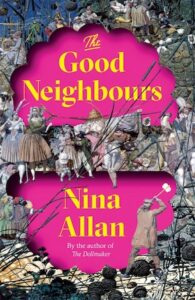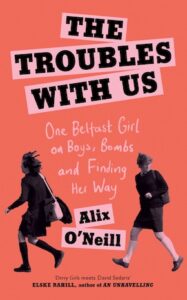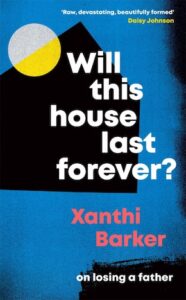Shades of remembering
by Sonia Weir
“A captivating exploration of community, tragedy and memory.” Irenosen Okojie
The Good Neighbours by Nina Allan (riverrun, 10 June) is set on the Isle of Bute, a not too remote island near Glasgow. Cath, who is from the island but living in the big city, is a freelance photographer who takes pictures of murder houses for a new project. This takes her back to where she lived as a teenager, and to the house where her best friend Shirley was murdered along with her family by her father John Craigie. Something doesn’t sit right with Cath, and she believes the father might not be the murderer. She finds that the Craigies’ house is now occupied by Alice Rahman, who has fled a stressful life in London. They form an intense friendship while reinvestigating the Craigie murders.
Allan explores themes of domestic abuse, mental health, trauma and myths about fairy folk – ‘good neighbours’ – and trying to keep them at bay. With Shirley’s guiding voice, Cath comes to terms with how the murders have also affected her own life and the guilt she feels for not having tried to save Shirley. It also makes her realise that the things you can’t see are just as important as what’s right in front of you. This is a gripping story that keeps you hooked until the final revelation.
Xanthi Barker’s father, the poet Sebastian Barker, died when she was in her mid-twenties, leaving her bereft with yearning for a father she never really knew. In Will This House Last Forever? (Tinder Press, 24 June) she tries to make sense of who her father was and how he made such an impact on her life without ever really being there for her.
Her parents were madly in love and created a wonderful life together, including building a house in Greece where they would spend a lot of their time. But things changed when Xanthi and her brother were born. He said he needed space and quiet to write, so he asked his wife and children to move out. At first he said it was temporary, and Xanthi believed that until her mother found out that he had married someone else. One minute he was fulfilling the role of the father she craved by building her a wooden rocking horse, and the next he would simply disappear. This pattern was repeated throughout her childhood.
She is angry at her father for not being there for the family when he was most needed, always using his writing as an excuse. She adored him but always felt conflicted about her feelings for him. How could she love a father who constantly let her down?
It was hard to read about the last time she saw him alive at one of his poetry readings; this big presence in her life now so frail and needy. She looked after him so tenderly and you can really feel the love between them. She struggles with the fact that he promised to meet her a couple of days later but died before that meeting could take place.
At times you feel that you are party to a deeply personal conversation between a daughter and a father and all you want to do is look away. There is no resolution here, just a constant yearning to be loved by a parent. Ultimately this is a book about processing grief and making peace with a deeply flawed father.
You get a real sense of what it was like to grow up in Belfast during The Troubles. One moment you’re obsessing over your first boyfriend, the next your favourite pub has been blown up.”

“It’s eye-wateringly funny, clever, insightful, emotional – all things you could want from a memoir.” Lucy Vine
With Northern Ireland in the headlines over new concerns about the border due to Brexit, Alix O’Neill’s The Troubles With Us (Fourth Estate, 24 June) is a timely reminder of the history between the two countries of Ireland and the sheer madness of growing up in sectarian division. Alix’s upbringing for her was a normal one, she didn’t know any different. But she grew up with bombs, prejudice and constant threats to her family’s safety. She also realised that her family was full of secrets that would eventually be exposed. Writing about her upbringing with all that it entailed, it’s a memoir full of warmth and affection for her family and friends.
Growing up during the 80s and 90s, Alix saw some of the worst of the 30-year conflict and also the resolution of the Good Friday Agreement. Her memoir is moving and at times very funny. Navigating your way to adulthood can be frightening enough, but growing up in Belfast there was the added danger of bullets, bombs and blazing buses. She seamlessly interweaves the political and historical events with her own personal story.
She highlights the ridiculousness of the prejudices between the two religions. It was common knowledge amongst Catholics that Protestants kept their eggs in the cupboard and not the fridge, they had eyes closer together and they were cleaner than Catholics!
Peppered with cultural references, you get a real sense of what it was like to grow up in Belfast during The Troubles. One moment you’re obsessing over your first boyfriend, the next your favourite pub has been blown up – on a night that thankfully she decided to be elsewhere.
With the Good Friday Agreement being in place for only just over 20 years and, as we have seen over the past few months, peace being a very fragile thing, this is a great read to remind ourselves of our very recent history and its effects. I recently reviewed Thin Places by Kerri ní Dochartaigh, also a memoir about growing up during The Troubles, but these two books are very individual and it’s really interesting how people can process and deal with similar experiences very differently. If you enjoyed the TV series Derry Girls then this book is for you.
Sonia Weir is a contributing editor to Bookanista. She started the Ultimate Reads and Recommendations Facebook group in December 2018, which now has over 500 members from all over the world. The group is inclusive and aimed at every reader, no matter the books, authors or genre.
Ultimate Reads and Recommendations
Instagram @soniaweir
Twitter @soniaweir


